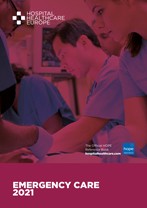Simulation-based training for paediatric resuscitation skills four months following the initial training improved retention scores after eight months.
Simulation-based training improves knowledge retention for those undergoing paediatric resuscitation training. After completion of the American Heart Association Pediatric Advanced Life Support (PALS) programme, it is recommended that recertification should occur every 2 years.1 Despite this recommendation, a systematic review of studies examining retention of adult advanced life support knowledge and skills, found that both knowledge and skills decay 6 months to 1 year after training.2 Furthermore, the incidence of in-hospital cardiopulmonary arrests in paediatric patients is very low, ranging from 0.7% to 3% of all hospital admissions.3 Consequently, the capacity to master these skills through experience in clinical practice is limited. One approach to ensure that the necessary medical knowledge and skills are achieved is through a simulated-based curriculum, and this has been shown to enhance skills for handling medical emergencies.4 However, while this approach improves knowledge, it is less clear whether the technique supports the retention of knowledge.
This led a team from the Department of Pediatrics, University of Chicago, US, to explore the impact on retention of resuscitation skills, 8 months after a PALS course when reinforced by an adjunct simulation-based curriculum, 4 months after the initial PALS course.5 The team undertook a randomised, partially double-blind, controlled trial with first-year paediatric residents, who were blinded to the purpose of the study. To evaluate PALS procedural and cognitive skills, the residents had to complete simulation-based assessments (SBAs) on chest compression, airway management with bag-valve mask ventilation, intraosseous access and code team leadership. For each of the SBAs, a knowledge assessment tool was developed and used by trained raters, who watched video recordings of each resident performing the SBAs. The intervention group participated in SBAs and the simulation-based curriculum at 4 and 8 months after the PALS training, whereas the control group did not undergo the 4-month training session. The primary outcome was the changes in retention skills score at 8 months after the PALS course and assessed by the same raters at each time point.
Findings
A total of 24 residents were included and equally matched between the intervention and control groups. After 8 months, the overall mean per cent score for the intervention group on all four SBAs was 0.57 (95% CI 0.55–0.59) and 0.52 (95% CI 0.50–0.54) for the control group and this difference was statistically significant (p = 0.037). However, there was no significant difference between the two groups for each of the four individual SBAs. In addition, the intervention group had greater retention of cognitive knowledge mean scores (0.78 vs 0.68, intervention vs control, p = 0.049). The overall SBAs mean scores for all residents reduced from a mean percent of 0.61 at baseline to 0.55 at 8 months.
The authors commented on how the simulation-based curriculum significantly improved residents’ paediatric resuscitation skills. They concluded that this approach provided a suitable pathway for safeguarding against the decay of resuscitation skills.
References
- ACGME Program Requirements for Graduate Medical Education in Pediatrics.
- Yang CW et al. A systematic review of retention of adult advanced life support knowledge and skills in healthcare providers. Resuscitation 2012;83(9):1055–60.
- Brilli RJ et al. Implementation of a medical emergency team in a large pediatric teaching hospital prevents respiratory and cardiopulmonary arrests outside the intensive care unit. Pediatr Crit Care Med. 2007; 8:236–46.
- Ruesseler M et al. Simulation training improves ability to manage medical emergencies. Emerg Med J 2010;27(10):734–8.
- Jani P et al. Simulation-Based Curricula for Enhanced Retention of Pediatric Resuscitation Skills. A Randomized Controlled Study. Pediatr Emer Care 2021;37:e645-e652.





